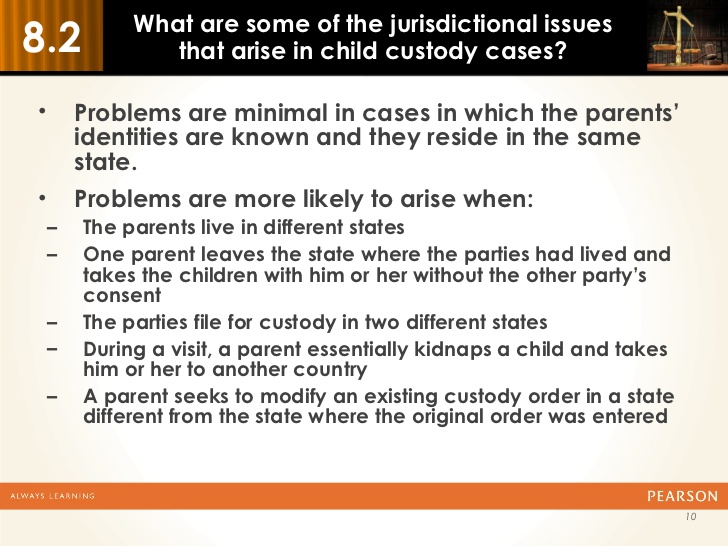This is a very complicated subject matter and, yet crucial to understand. The intent of the following information is to get a glimpse of what the laws are that govern the decisions of judges and a basic understanding which court has jurisdiction to hear the case. It is further recommended to seek the advise of a competent attorney or other legal professional on these issues.
How this argument is presented to the Judge whether written or oral is crucial, having the attorney or yourself knowledgeable on the Jurisdictional issues at hand, along with the laws of the UCCJA, UCCJEA & PKPA, and the Best interest of the child doctrine. You must show the judge the federal laws of these sources which are primary law, and how they apply to your case, using past cases found in your District Courts to use as precedence, a case like yours, a person like you won, and you argue in your brief you should be treated the same.
It is highly advised if you are having an attorney represent you, you must let him or her know you want to read prior to him giving to a Judge all briefs, and documents he files with the court. You can not assume anything you get one chance to make an appeal to a judge on why he should grant a favorable decision, it is all on how it is presented, having sited laws, and facts in the most favorable light of your case.
Jurisdiction– Of great importance over what and when is the court empowered to render decisions.
Venue – Where should the action be filed & heard
- Does the court have subject jurisdiction – The power that the court may exercise over the subject matter of the litigation.
- Does the court have personal jurisdiction – A courts power to bring a person into its jurisdiction to render a court decision.
There are times when a parent moves or wants to move to another, County, City, or State.
Click Here Explained by FindLaw the court’s Jurisdiction over Custody and Visitation Cases
Click Here Information on Interstate Custody Arrangements Can your Ex-Spouse that lives in another State go to court to get the custody of your children
Domicile – Is a place of a persons intended permanent residence, a person can only have one domicile, this will continue to be that persons domicile until he leaves the state and establishes a presence in another state with the intent to remain there. Mere absence from the state does not destroy a person’s stat ice as being domiciled there.
Anyone can have several residences, but only one domicile. To establish domicile, one must establish intent some evidence could be a home ownership,
Voter’s registration location of filing taxes, where an individual pays state taxes, all of these establish intent
******** Very important. ******** Some States will recognize you as a resident of a state after being in that state 6 months. Unless you show reasons why you should not be considered a resident there, and prove intent.
Find out Your States Divorce Residency Laws Click Here A chart that gives the required durational period of divorce residency. As long as you meet the durational time period , you should be able to file for divorce in that state.
Another Important issue – The State that is first to acquire Jurisdiction over the other party by “Service of Process” that means the responding party is brought into the court system, and notified of the nature of the action being taken against him. This will be the first step giving the court jurisdiction over the defendant, the defendant will have to answer the court, and at that time will be able to dispute the Jurisdiction of that court if the law is applicable to the circumstances. If the defendant does not appear in court, he loses the case with out being able to defend him. This step is crucial and will determine what court will hear and make a decision in a custody ruling.
******The party that serves***** (not files in court) the other party first – acquires jurisdiction over the other party. Huge plus for the filing party for the coarse of the litigation process.
Serving Court papers on a individual Learn the process Click Here
Serving Court Papers on a Business Click Here find out who should be served
The Uniform Child Custody Jurisdiction Act (UCCJA) was enacted in 1981, and The Uniform Child Jurisdiction and Enforcement Act (UCCJEA) was drafted to harmonize the UCCJA and the PKPA which is the Parental Kidnapping Prevention Act of 1980 all of these Acts have standardized the rules for jurisdiction to determine child custody. A court can make an initial child custody decision only if the court has jurisdiction of the child under the bases listed in the States version of the UCCJA or UCCJEA. Because of the possible need for interstate enforcement, the lawyer should also ensure that the original order meets the standards of the Parental Kidnapping Prevention Act of 1980 (PKPA) to be ensuring that full faith and credit will be given to an initial or a modification decree.
The UCCJA was put in place to attempt to create uniformity in custody jurisdiction, In the past and because of the new laws the days of when custodial parents (who had physical custody) were unhappy with a custody order from one state would move to another state and petition the court for a modification of the order, Judges often signed those orders.
The reasons for the UCCJA was implemented was to
- To discourage continued jurisdictional controversies between states.
- To deter child abductions
- To promote uniformity in state jurisdictional laws:
- To promote interstate cooperation and communication in adjudication Child custody matters:
- To avoid re-litigation of custody orders
- To facilitate the enforcement of custody decrees of sister states
The UCCJA required:
- Strong ties with the forum state
- Litigants to give information about possible pending jurisdiction in another state
- Communication with other potential forums
Today all states but one use the (UCCJEA) Uniform Child Custody Jurisdiction and Enforcement Act most states rely heavily on case law from other jurisdiction
3 step- processes for determining whether a state should assume jurisdiction of a custody matter requires:
1)A court to determine if it has authority, or jurisdiction, to act following the guidelines of the UCCJEA governing jurisdiction
2)A determination as to which court is the more appropriate and convenient forum under the UCCJEA guide-lines governing inconvenient forum, and
3)If the court accepts jurisdiction as the more convenient forum the court must determine if the action to be taken is foreclosed by an order or judgment of the other state court.
Congress enacted the Parental Kidnapping Prevention Act of 1980
Because jurisdictional problems continued to arise, especially following the initial decree. The PKPA as federal law preempts state law and applies to all states.
While the UCCJA helped reduce interstate controversies, not all states enacted the same version of the UCCJA and the UCCJA failed to eliminate the possibility of two states having concurrent jurisdiction. Problems existed both at the initial stage and at the modification stage. At the initial stage, one state could be a child’s home state and another state could still have a coequal claim due to “ significant contacts and substantial evidence.” As to modification the UCCJA could result in two states having modification jurisdiction.
The PKPA provides a uniform approach to interpreting jurisdictional conflicts and improved the UCCJA in TWO major ways:
- The PKPA makes the “home state a priority”. Only if there is no home state can a state, which has a significant connection to take jurisdiction.
- Second what the PKPA did was to adopt the concept of exclusive continuing jurisdiction. If one state properly exercised jurisdiction, it continued as long as the state remains the residence of any contestant or the child.
- The PKPA provides that a state should give full faith and credit to a sister state’s custody order if it meets PKPA requirements. No kidnapping or other wrongdoing is required for PKPA to operate. The Uniform Child Custody Jurisdiction and Enforcement Act conform to the PKPA.
- It prioritizes “home state “ jurisdiction. The UCCJEA also eliminates a determination of “best interests” of a child from the jurisdictional inquiry. The intent is for courts to construe the UCCJEA to avoid the jurisdictional competition that comes from each state substantively reviewing subjective factors, such as “best interests of the child”.
- If a state exercises jurisdiction in violation of the PKPA, the proper challenge is an appeal in the state court followed by a writ of certiorari action may be possible against the state court judge and the other parent for violating PKPA.
- The PKPA does not deny trial courts any jurisdiction to determine child custody disputes; rather, it sets criteria for determining weather a child custody determination by one state is entitled to full faith and credit by another state
- As a general rule, federal legislation preempts conflicting state law under the Supremacy Clause of the United States Constitution.
- The PKPA preempts state law and governs if there is a conflict. Even if the court does not find that the PKPA preempts state law, the court may find it is preferable for courts to decline to enter orders that will not be entitled to full faith and credit. This is the approach taken by the Uniform Child custody Jurisdiction and Enforcement Act.
- The main place that the PKPA comes into play is with modification of sister state orders. Under the PKPA,
A Court of one state can modify the child custody order of another State Court only if:
1)It has jurisdiction to make such a state no longer has jurisdiction or has declined to exercise its jurisdiction.
- Under the PKPA, jurisdictional preference is given to the state with continuing jurisdiction.
- The order of jurisdictional preference under the PKPA is
1)Continuing jurisdiction
2)Home state jurisdiction
3)Significant connection jurisdiction
4)Jurisdiction when no other jurisdictional basis is available
Below are the actual Acts and Congressional Reports made by the Commission, They are lengthly but have detailed information about the Acts, and the intent of the Acts. These Acts are the Laws governing the Judges in Court Cases
Acts and Congressional Reports
Uniform Matrimonial and Family Laws Locator
This Locator links to State Laws which correspond to Uniform Laws in the subject of Family Law
Child Abduction Prevention
Child Custody Jurisdiction and Enforcement Act
Child Custody Jurisdiction and Enforcement Act (2013)
Child Witness Testimony by alternative Methods Act
Collaborative Law Act
Deployed Parents Custody and Visitation Act
Parentage Act
Premarital and Marital Agreements Act
Representation of Children in Abuse , Neglect , and Custody Proceedings Act
This Book is for Move Away Cases, or when one parent leaves a State with the Children, Below information for Military families as well.
Child Custody Jurisdiction; The UCCJEA & PKPA
written by 2 attorneys specializing in Family Law, and published this book for the American Bar Association for Attorneys, Author is stating the Case law in many States is evolving and will continue to evolve for the foreseeable future. Many States have yet to address significant portions of the UCCJEA and PKPA , Some sections , such as most of Article 3, Enforcement, of the UCCJEA, have yet to be addressed in depth by any state suprememe court. That could be interpreted as meaning no one is challenging the Judges in their rulings on the Enforcement issue, and so there for is not making to the Court of Appeals or Supremem Court to help clarify the intent of the law but also help judges to enforce the law as more attorney’s use the outcome of past cases for the prestent cases in litigation.
The Uniform Laws Annotated Matrimonial Family and Health Lawby West Law
When a book is annotated it is easy to understand the law by explaining it, interpreting its meaning or intent.
Uniform laws read the definition by Cornell University Law School
Frequently Asked Questions to Uniform Law Commision the Commision that gathers the information to implement laws
Click Here





